Main researcher: Clara Ruiz Ponte
1. Hereditary Predisposition Rare Syndrome to Gastrointestinal Cancer: Familial adenomatous polyposis (FAP, AFAP, MAP, PPAP), mixed polyposis syndrome, serrated polyposissydrome, juvenile polyposis syndrome, Lynch syndrome, Lynch-like syndrome, Constitutional Mismatch Repair Deficiency Syndrome (CMMRD), Familial colorectal cancer type X, Cowden syndrome, Peutz-Jeghers syndrome and hereditary diffuse gastric cancer..
- Genetic and molecular analysis strategies for the identification of causal genetic variants in susceptibility genes:
-Incorporation and evaluation of new data analysis pipelines NGS
-Interpretation and classification of genetic variants of uncertain significance
-Selection of patients with suspected Lynch syndrome: clinical criteria vs molecular studies
-Involvement of MUTYH in non-polyposis phenotypes
-Involvement of Fanconi anemia pathway genes in hereditary colorectal cancer - Validation of new candidates genes identified by complete sequencing of exomes. Translation to genetic diagnosis
- Clinical criteria and diagnostic methods in CMMRD families
- Implementation and evaluation of methods of detection of somatic mutations
2. Genomics of colorectal cancer (CRC) and colonic Polyposis of unknown origin.
- Complete sequencing of exomes: identification of new genes of susceptibility colonic Polyposis of unknown originand colorectal cancer in young patients
- GWAS approximations and fine-mapping studies: identification of common variants in CRC

Main researcher: Ana Vega Gliemmo
1.Genetic susceptibility to cancer
- Familial and hereditary breast / ovarian cancer:
- BRCA1 and BRCA2 genes
- Identification of new genes and diagnostic indications
- Prevalence of mutations in Galicia and Spain
- Recurrent and founder mutations
- Risk of carriers to the development of breast / ovarian / prostate / pancreatic cancer …
- Characterization of genetic variants through in silico studies, splicing (RNA, hybrid minigenes), functional…
- Study of regulatory variants
- Identification of common variants in breast and ovarian cancer
- Identification of new variants through GWAS, fine-mapping, TWAS…
- In silico validation
- Predictive model risk
- Prostate cancer, pancreatic cancer
- Identification of genetic susceptibility factors (GWAS, TWAS…)
- Implication of Homologous Recombination genes in the development of prostate / pancreas cancer
2. Biomarkers in cancer
Radiogenomics: study of the genetic variation associated with the response to radiation therapy. Genetic variants such as SNPs are studied in relation to the risk of cancer patients to develop toxicity by radiotherapy.
Objective: Predictive models of susceptibility to ionizing radiation that include biomarkers (SNPS, RILA …).
- Identification of biomarkers
- Genome Wide Association Studies (GWAS), fine-mapping…
- Whole Exome Sequencing in extreme phenotypes
- RNAseq
- Functional validation of candidate genes
- Cellular models
- Animal models
3. Syndromes of predisposition to cancer and genodermatosis
- Cancer predisposition syndromes
- Birt Hogg Dubbé syndrome
- Cowden syndrome
- Gorlin syndrome
- Li-Fraumeni syndrome
- Hereditary melanoma
- Familial osteochondromatosis
- Genodermatosis
- Autosomal recessive congenital Ichthyosis (ARCI)
- Prevalence of mutations in Galicia and Spain
- Recurrent and founding mutations (dating of mutations)
- Search for new genes through exome analysis
- Studies of phenotype-genotype correlation

Main researcher: Manuela Gago Domínguez
1. Molecular and Genetic Cancer Epidemiology:
- Breast Cance
– BREOGAN, the Galician Mammary Oncology Network, part of the International Consortium of Breast Cancer BCAC
– OncoArray Network: susceptibility studyof germline genetic variants GWAS.
– Validation of new candidate genes identified by sequencing.
- Genomic Studies of other Neoplasms
– Susceptibility study of germline genetic variants GWAS of colorectal cancer, prostate cancer and urinary tract cancer.
2. Biomarkers of Cancer Susceptibility (Screening and Diagnosis):
- Biochemical markers of oxidative stress and apoptosis in the development of breast cancer.
3. Gen X Environment Interactions GXA
- GxA Analysis and breast cancer risk and ER-negative.
- GxA Analysis and risk of other malignancies such as prostate, colorectal and bladder.
4. Identification of Specific Risk Determinants and Forecast for Tumor Subtypes
- Breast Cancer: Study of stratification of breast cancer based on tumor profile: Breast Cancer Stratification Tumor Profiling, BCAST.
- Prostate and Bladder Cancer: Study of stratification of prostate and bladder cancer based in the genetic profile.
5. Research linked to Survival
- Study of the effect of germline genetic variants on survival to breast cancer, colorectalcancer, prostate cancer and urinary tract cancer.
6. Cancer Chemoprophylaxis:
- Preventionassay of Omega-3 fatty acids in women with high risk ofbreast cancer.
- Phase II assay, randomized, prospective, placebo-controlled study to evaluate the chemopreventiveeffect of vitamin D in women with high risk of breast cancer.







